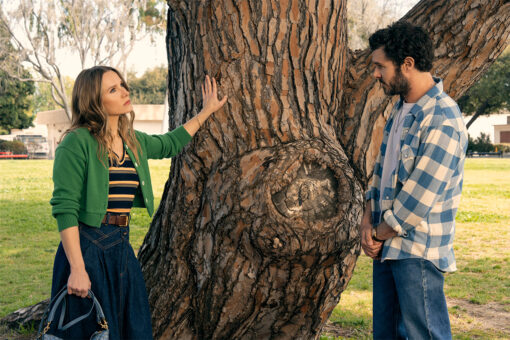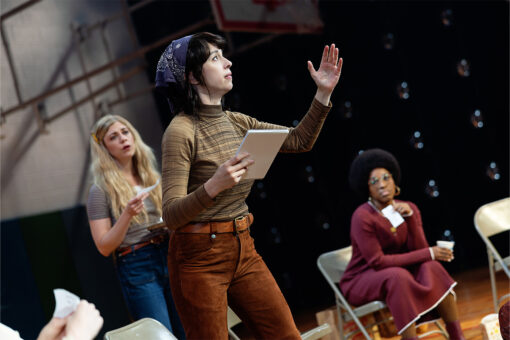When I decided that I wanted to write a play, I knew that it was going to be about death. As with many Jews, it’s a subject that’s well-worn in my mind. I’ve grown up learning about and mourning countless dead Jews who came before me, and it’s partially this rearing, I believe, that’s made me into a person who wants to discuss death in a society that deems it taboo.
When somebody that I love dies, I want nothing more than to talk about them, about the person who meant so much to me and who is now no longer here. Unfortunately, “please don’t kill the vibe, please don’t bring the mood down, please tamper your grief within 2-5 business days,” seems to be the unspoken expectation in America. But the alternative is to be haunted by your loss, carrying the silent weight of absence behind you like a pile of bricks. You have more things you want to say to the person who is now gone, things you didn’t realize you’d never have a chance to say again. Your loved one’s death isn’t an object lesson in plucky honesty; in fact, there’s no lesson to be learned at all. There’s nothing but the pit in your chest, the ache for someone who is lost to you and the realization that you will accumulate many of these devastating griefs as your life, somehow, goes on.
To be haunted, then, is to be simultaneously lonely and never alone. It is to feel a void as a presence. I’m haunted by the specter of loss, because I will lose people I love and because I love people who are already gone — and adjacently, I’m haunted because I’m a Jew, and haunting is in our bones. It has always felt to me like the least I can do is to try and express those feelings, in hopes that acknowledging my ghosts will make me feel less lonely about it all, or in hopes someone will hear me and say, “Come sit next to me; I’m haunted too.” And so I found an outlet in the arts. I first became a writer in middle school, then an actor after college and now, in my late 20s: a playwright.
My first ever play, “Dybbrooke,” recently premiered at the 2024 Atlanta Fringe Festival. Because it was my first play, I wanted it to encompass subjects that I consider fundamental to my emotional and artistic sensibilities: death and Judaism. When my research introduced me to the Kabbalistic dybbuk, it felt like creative bashert.
A brief introduction to dybbuks: They begin to emerge in Jewish folklore during the early modern period, specifically alongside an increased Jewish belief in reincarnation. A transmigrating spirit might be unable to make the passage into the next life and would find themselves trapped between worlds. This state of limbo was so torturous that the spirit would try to find refuge in a living body, hence, a dybbuk: a clinging spirit. And while a dybbuk would clearly be experiencing a painful journey, being possessed by a dybbuk could be an exploitative and harrowing experience of its own. There’s a lot to unpack in dybbuk narratives, so allow me to be clear upfront: The history of the dybbuk is broad and extremely loaded, certainly too much to fully explore in this essay. But here’s how dybbuk narratives have visited and impacted me and my creative work.
A major influence on my script was S. Ansky’s landmark early 20th century play “The Dybbuk.” Ansky, both a Jew and a folklorist of Jewish culture, wrote his play after visiting and speaking to the residents of Eastern European shtetls, which makes it all the more interesting that in “The Dybbuk,” dybbuk possession takes on a more positive connotation. “I smashed all barriers, I conquered death…” says Khonen, Ansky’s titular dybbuk, to his beloved Leah. “…And when my final spark of strength was snuffed, I left your body so I could return to your soul.” Given the breadth of dybbuk narratives I read — from the romantic to the violating and everything in between — it felt inappropriate of me to depict dybbuk possession as either strictly negative or strictly positive. We’re Jews! We always have more questions than answers. So it became my goal to craft a script that was comfortable with discomfort. I wanted to write something that was as haunted as I felt.
In “Dybbrooke,” my titular dybbuk Brooke possesses the body of Leah, a mortician named in homage to “The Dybbuk.” As I wrote my play, Leah grew into a character who’s obsessed with what’s beyond the grave, while Brooke desperately clung to what came before. It was cathartic to spend time with these women, who were messy and flawed and fallible and ultimately spoke to all of the ghosts that I’ve come to coexist with. One actor portrays both characters in the same body, something that I thought would look extremely cool on stage and that spoke to the similarity at the heart of their differences: How do we love each other past the boundaries of life? What does it mean to do so? How do we grapple with our ghosts?
Ultimately, I wrote a story that explored an underlying concept I found in nearly every dybbuk narrative I encountered: A dybbuk exorcism is almost as much about finding peace for the dybbuk as it is about finding peace for the possessed. Regardless of who the dybbuk was in life, there is still a need for compassion and a responsibility to help them find true respite from their suffering — to extend care beyond mortal limits.
What an extraordinary kindness, I thought. I’ve sat beside the grave of a loved one and spoke to the ground, hoping more than anything that they could hear me and that they were okay. If I knew they were okay, would I be at peace? Truthfully, there’s something frightening about the potential for that sort of closure. If I heal the wound, can I still touch and feel the scar? Or will it fade to a point where I don’t notice it anymore? I’m terrified — deeply, genuinely terrified — of not being able to feel those stitches. But in a dybbuk story, to hold the wound open is to prolong suffering for all parties, and it’s this particularly painful contradiction that strikes me deepest and lives within the core of my script.
I’m not done with “Dybbrooke” — not even close. The script is currently written to fit into the one-hour Fringe Festival time slot, and I want to expand it into something greater and fully realized. There’s more research to do, more folklore to explore and more ghosts to meet. And no matter what becomes of those ghosts, I hope that they understand how much I love them. After all, to live is to love, no matter how temporary each life may be.



